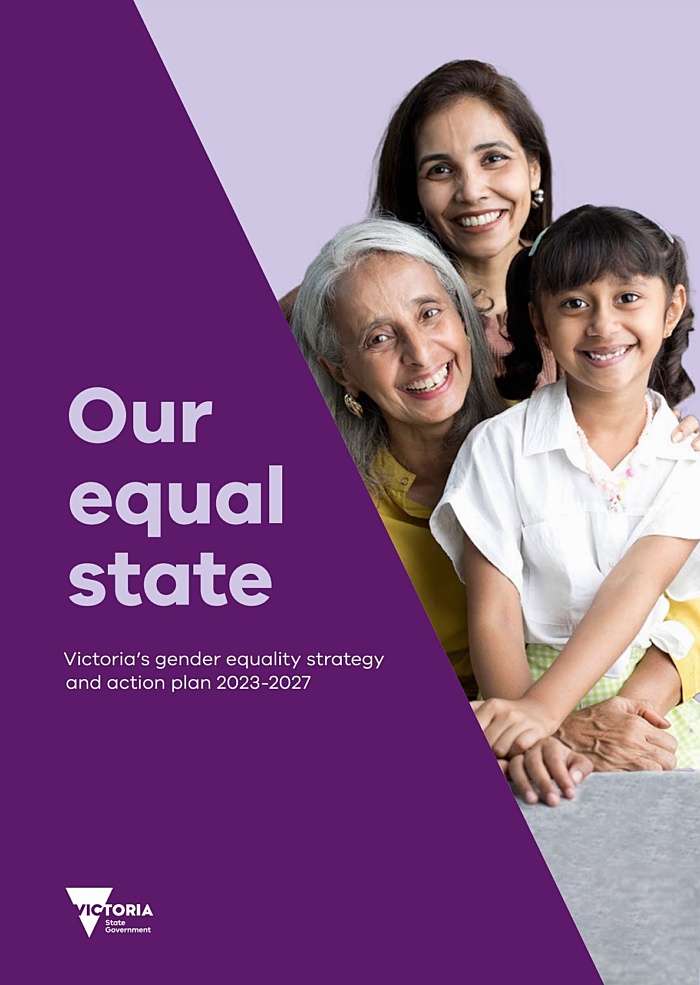
Attention governments: There’s more to giving out grants than handing over the money
Posted on 18 Feb 2026
Around 50 per cent of all funding for charities in Australia comes from government. The nature of…
Posted on 28 Aug 2023
By Greg Thom, journalist, Institute of Community Directors Australia

The Victorian government has launched a comprehensive four year strategy containing 110 actions and measurable targets designed to address gender inequality.
When Dr Leonora Risse was asked during a panel discussion at the launch of the Victorian Government’s gender equality strategy why women don’t have a seat at the table, she turned the question on its head.
“The question we should be asking is ‘who built the table and who is handing out the invitations,’” responded the economist and academic who specialises in gender equality.
Our equal state is the Andrews government’s attempt to address these questions and provide a blueprint for government spending and initiatives over the next four years toward driving gender equality.
The 86-page document contains 110 actions which range from halving the gender pay gap in the Victorian Public Service and improving job security and conditions for women via a new Fair Jobs Code to $23 million to fund free pads and tampons at 700 public locations across the state.

The wide-ranging strategy seeks to embed the knowledge that gender equality is everyone’s responsibility and focuses on its impact in three stages of life - childhood and youth, adulthood and old age.
The aim is to ‘highlight the gendered gaps in choices and opportunities between women, men and gender diverse people at different ages, and outline actions to close them.’

These actions fall into five categories:
Our Equal State follows on from the release of Victoria’s inaugural gender equality strategy, Safe and Strong in 2016, the first of its kind in Australia.
Sector organisations were well represented among the diverse audience of 350 people who attended the Our Equal State launch at the historic Melbourne Town Hall.
They included Multicultural Centre for Women’s Health executive director Dr Adele Murdolo, Council of Single Mothers and their Children CEO Jenny Davidson and Our Community Chair Carol Schwartz.
Victorian Government Minister for Women Natalie Hutchins, said the strategy addresses the fact that gender inequality is compounded by intersecting forms of discrimination and disadvantage, including racism, homophobia, ableism and ageism.
“We need to ensure the girls of today are empowered to be the women of tomorrow regardless of the colour of their skin, religious beliefs or cultural upbringing,” said Ms Hutchins.
“We’ve made nation-leading progress on gender equality, but we know there’s still significant work to do and we’ll continue to stand strong against biased systems and toxic ideas.”
“We need to ensure the girls of today are empowered to be the women of tomorrow regardless of the colour of their skin, religious beliefs or cultural upbringing.”
The launch of the strategy featured a panel discussion exploring different perspectives on gender diversity:
Victorian Aboriginal Community Controlled Health Organisation CEO Jill Gallagher, said from her cultural perspective, she found it difficult to understand why women needed to strive to achieve gender equality at all.
“In the traditional Aboriginal lifestyle, before colonisation began in this country, there was no real gender inequality,” she said.
“What there was, were very clear roles and responsibilities.”
Fellow panellist senior RMIT lecturer Dr Leonora Risse, questioned the existence of gender-based roles and why many women early in their careers are told they needed to work harder than men to achieve recognition and success.
“I think maybe the world has progressed to realising and accepting that it is not about the individuals’ deficiencies. It’s about a system that is not fully inclusive and that’s what I see [being addressed] in this strategy.”
One of three teenage schoolgirls who shared what gender equality meant to them, 14-year-old Firbank Grammar student Emerald, drew laughter from the audience when she suggested tongue in cheek that educators should consider including the Matilda’s success as part of their school’s gender studies curriculum.


Posted on 18 Feb 2026
Around 50 per cent of all funding for charities in Australia comes from government. The nature of…

Posted on 18 Feb 2026
You wouldn’t try to fix a complex system with one tool. You’d widen the toolkit, improve the…

Posted on 18 Feb 2026
Australia’s champion laundry van charity, Orange Sky, has announced it is ready to expand into…

Posted on 18 Feb 2026
To have any hope of hitting the grand plan of doubling philanthropy by 2030, Australia needs one…

Posted on 18 Feb 2026
When Nyiyaparli woman Jahna Cedar travels to New York next month as part of the Australian…

Posted on 17 Feb 2026
This is the full academic version of Dr Oksana King's thoughts on the need to better compensate and…

Posted on 12 Feb 2026
Our special NFP trends report distils the views of more than two dozen experts.

Posted on 11 Feb 2026
The ballooning cost-of-living crisis is affecting Australian families to the extent that many…

Posted on 11 Feb 2026
Rev. Salesi Faupula is the Uniting Church’s moderator for the synod of Victoria and Tasmania. Born…

Posted on 11 Feb 2026
Service providers have expressed cautious support for the federal government’s Thriving Kids…

Posted on 11 Feb 2026
Australia’s not-for-profits need strategic investment by the federal government to support the…

Posted on 11 Feb 2026
For the first time, charities commissioner Sue Woodward has confirmed the Australian Charities and…